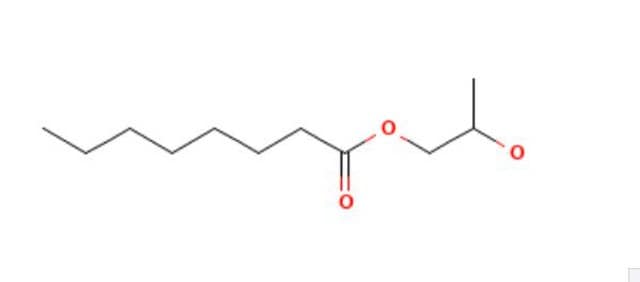Y0000319
Propylenglykolmonolaurat
European Pharmacopoeia (EP) Reference Standard
Anmeldenzur Ansicht organisationsspezifischer und vertraglich vereinbarter Preise
Alle Fotos(1)
About This Item
Empirische Formel (Hill-System):
C15H30O3
CAS-Nummer:
Molekulargewicht:
258.40
EG-Nummer:
UNSPSC-Code:
41116107
NACRES:
NA.24
Empfohlene Produkte
Qualität
pharmaceutical primary standard
API-Familie
propylene glycol
Hersteller/Markenname
EDQM
Anwendung(en)
pharmaceutical (small molecule)
Format
neat
Lagertemp.
2-8°C
InChI
1S/C15H30O3/c1-3-4-5-6-7-8-9-10-11-12-15(17)18-13-14(2)16/h14,16H,3-13H2,1-2H3
InChIKey
BHIZVZJETFVJMJ-UHFFFAOYSA-N
Allgemeine Beschreibung
This product is provided as delivered and specified by the issuing Pharmacopoeia. All information provided in support of this product, including SDS and any product information leaflets have been developed and issued under the Authority of the issuing Pharmacopoeia.For further information and support please go to the website of the issuing Pharmacopoeia.
Anwendung
Propylene glycol monolaurate EP Reference standard, intended for use in laboratory tests only as specifically prescribed in the European Pharmacopoeia.
Verpackung
The product is delivered as supplied by the issuing Pharmacopoeia. For the current unit quantity, please visit the EDQM reference substance catalogue.
Sonstige Hinweise
Sales restrictions may apply.
Ähnliches Produkt
Produkt-Nr.
Beschreibung
Preisangaben
Lagerklassenschlüssel
11 - Combustible Solids
WGK
WGK 3
Flammpunkt (°F)
Not applicable
Flammpunkt (°C)
Not applicable
Hier finden Sie alle aktuellen Versionen:
Analysenzertifikate (COA)
Lot/Batch Number
Leider sind derzeit keine COAs für dieses Produkt online verfügbar.
Wenn Sie Hilfe benötigen, wenden Sie sich bitte an Kundensupport
Besitzen Sie dieses Produkt bereits?
In der Dokumentenbibliothek finden Sie die Dokumentation zu den Produkten, die Sie kürzlich erworben haben.
Kunden haben sich ebenfalls angesehen
Nicholas C Obitte et al.
AIDS research and therapy, 10(1), 14-14 (2013-06-01)
CSIC (5-chloro-3-phenylsulfonylindole-2-carboxamide), a non-nucleoside reverse transcriptase inhibitor (NNRTI) has not been advanced as a therapeutic anti-HIV candidate drug due to its low aqueous solubility and poor bioavailability. The objective of this work was to formulate CSIC into self-emulsifying oil formulations
G D Irion et al.
Pharmaceutical research, 12(11), 1618-1622 (1995-11-01)
To measure the effect of a combination of excipients from a silicone based pressure sensitive adhesive (PSA) on drug transport across skin. Partitioning of propylene glycol monolaurate (PG-ML) from silicone PSA and a solution formulation into the stratum corneum (SC)
Archita Patel et al.
Current drug delivery, 12(6), 745-760 (2015-03-04)
The solid-self nanoemulsifying drug delivery system (S-SNEDDS) of Amiodarone hydrochloride (AH) was prepared and evaluated. AH exhibits poor aqueous solubility (0.3-0.5 mg/ml) and therefore variable oral bioavailability. Capmul MCM, Cremophor RH-40 and Propylene glycol were identified as oil, surfactant and
B R Jasti et al.
The journal of investigative dermatology. Symposium proceedings, 3(2), 128-130 (1998-09-12)
Excipients are often used in transdermal formulations to overcome the formidable barrier offered by the epidermis in order to achieve the target flux. In this study we describe the use of frequency-domain fluorescence spectroscopy to characterize the effect of two
Rana Abu-Huwaij et al.
Drug development and industrial pharmacy, 33(4), 437-448 (2007-05-25)
The aim of this study was to develop a controlled release buccal mucoadhesive delivery system for systemic delivery of lidocaine hydrochloride as a model drug. In vitro release and buccal permeation as well as in vivo permeation of LDHCL patches
Unser Team von Wissenschaftlern verfügt über Erfahrung in allen Forschungsbereichen einschließlich Life Science, Materialwissenschaften, chemischer Synthese, Chromatographie, Analytik und vielen mehr..
Setzen Sie sich mit dem technischen Dienst in Verbindung.






